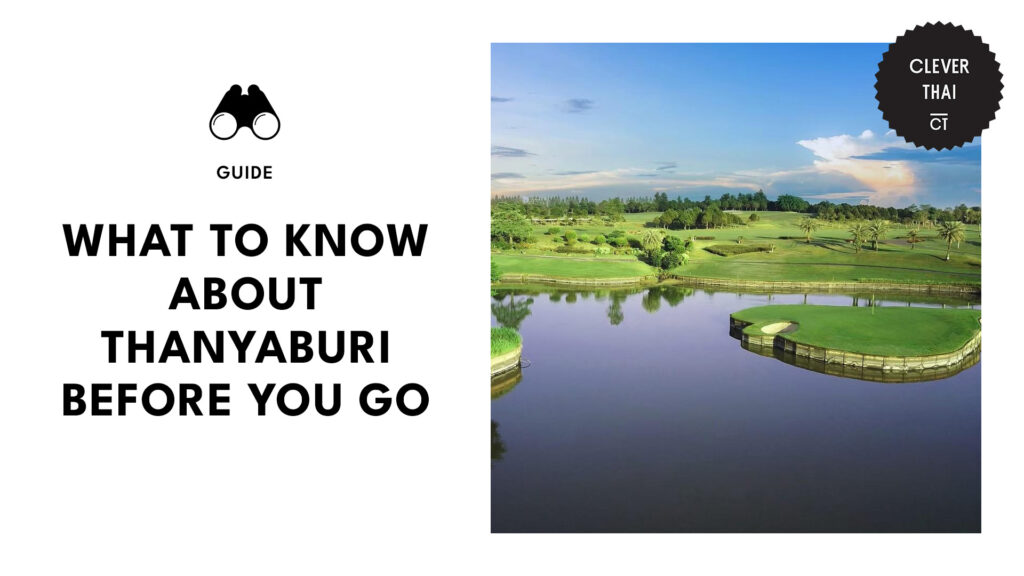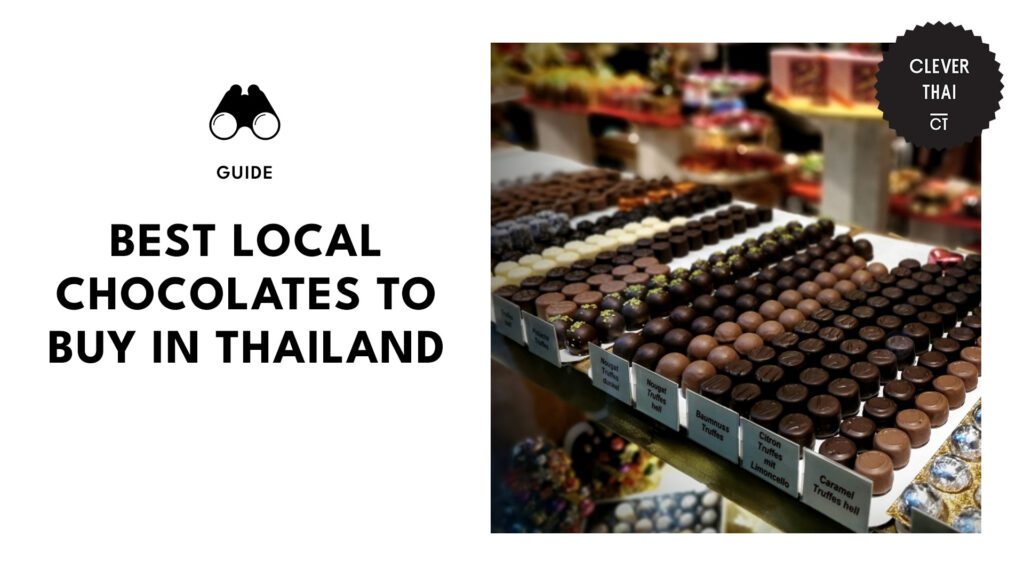Categories > Guides and Tips
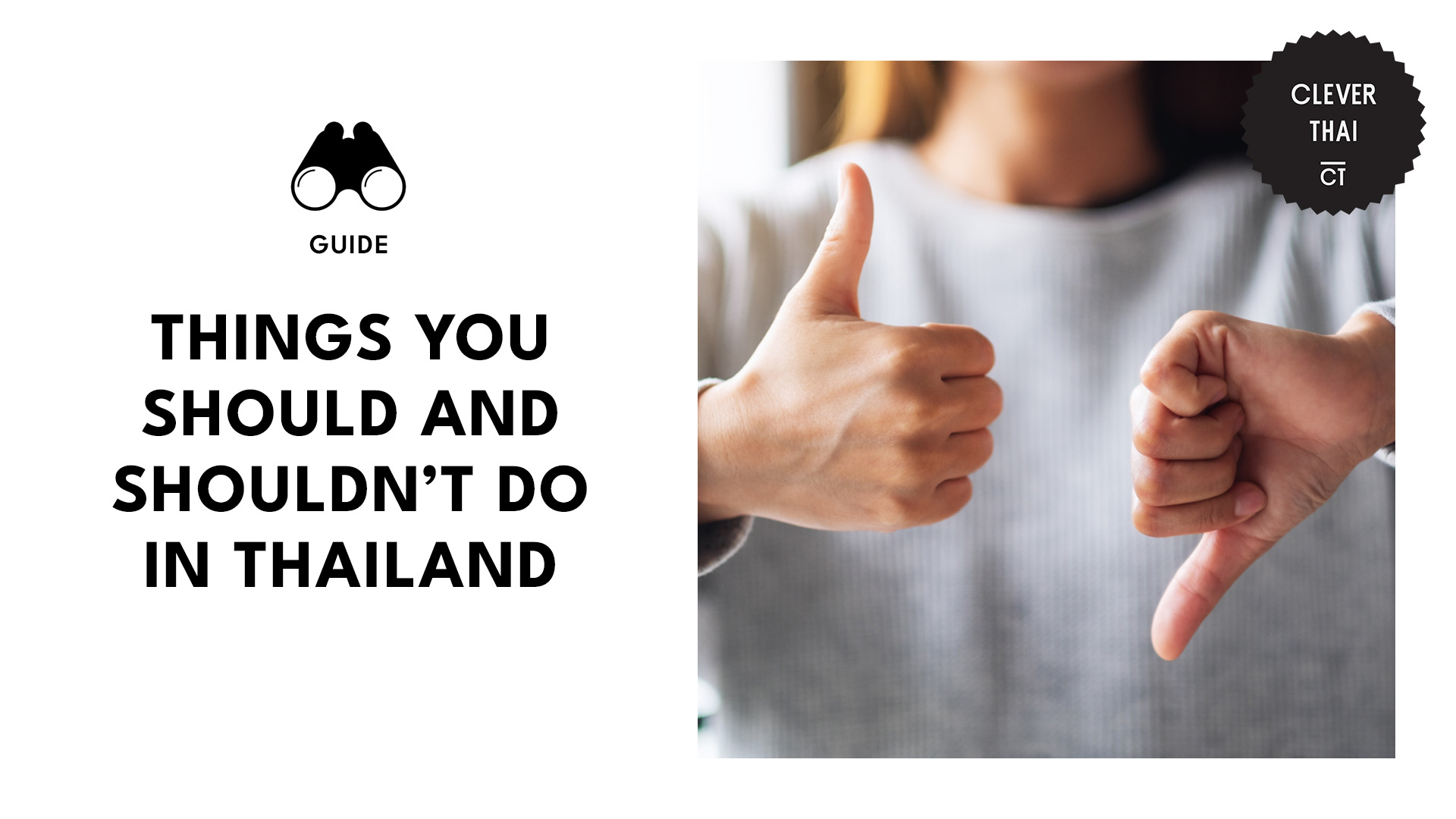
15 Things You Should and Shouldn’t Do in Thailand
- Top 15 Do’s and Don'ts in Thailand
- DO: Make sure to dress properly when visiting sacred places.
- DON’T: Point using your feet.
- DO: Take your shoes off.
- DO: Respect the monarchy.
- DO: Respect the monks.
- DON’T: Touch anyone’s head.
- DON’T: Put your feet up.
- DO: Use your right hand.
- DO: Use cutleries when eating when possible.
- Plain Sticky Rice
- Sweet Sticky Rice
- Seafood
- DO: Return the ‘wai’ greeting.
- DON’T: Lose your temper in public.
- DON’T: Throw things.
- DON’T: Publicly show too much affection.
- DO: Smile.
- DO: Lower your head when walking between two people.
- FAQs about Do’s and Don’ts in Thailand
Thailand is a beautiful country with friendly people, exotic cuisine, and great shopping malls. However, it also has its share of cultural rules that may differ from what you’re used to doing back home.
Dressing properly and respecting monks and strangers are some essential things visitors should do when visiting Thailand.
It is also crucial to learn the things to avoid doing that show disrespect for the Thai people, such as touching heads, using the left hand, and not returning the ‘wai.’
To help you accidentally making taboos and social impasses during your vacation, here are some do’s and don’ts when visiting Thailand:
Top 15 Do’s and Don’ts in Thailand
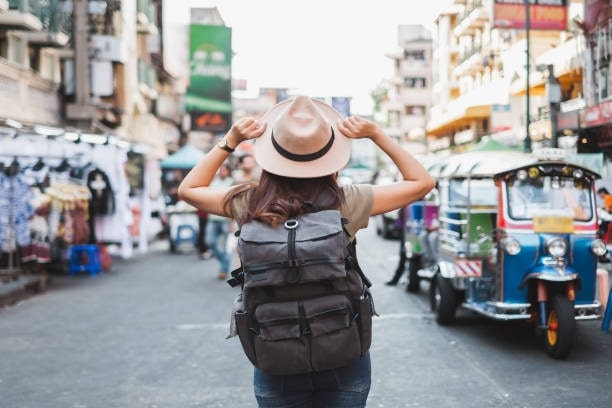
Thailand is a beautiful country, but you want to make sure you’re prepared for your trip.
Here are some of the important things to do and to avoid in Thailand:
1. DO: Make sure to dress properly when visiting sacred places.
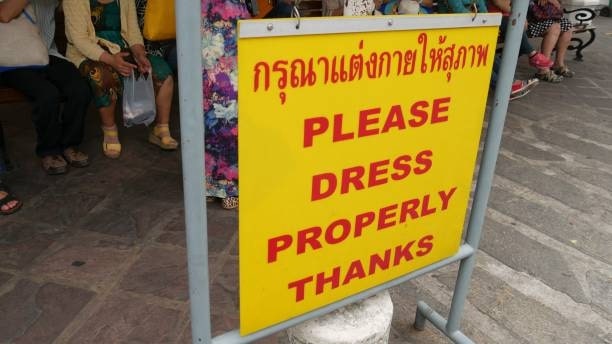
Thailand has a history of Buddhist occupation and influence, so it’s important to show respect for the local customs when visiting a temple in Thailand.
For instance, men should wear long pants and shirts with sleeves (no tank tops), and women should wear dresses with sleeves, pants, or skirts that cover their knees.
If you’re unsure about what to wear at the temple, ask someone who is well-versed in Thai culture or a fellow traveller who has visited the temple before.
You can also call ahead or check online for information about appropriate dress code at your destination.
2. DON’T: Point using your feet.
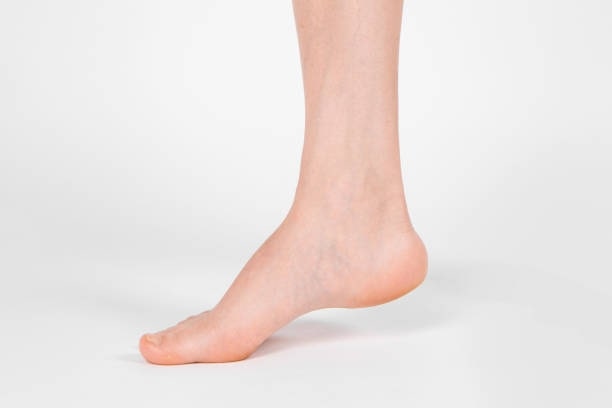
You must never point your toes at a statue or other representation of the Buddha. As a result, if you want to sit down in a temple, you must either be on your knees or have both legs crossed to one side (feet up and pointed backward).
This is particularly impolite behaviour when feet are pointing at a monk or Buddha figure. In addition, sit without crossing your legs.
3. DO: Take your shoes off.
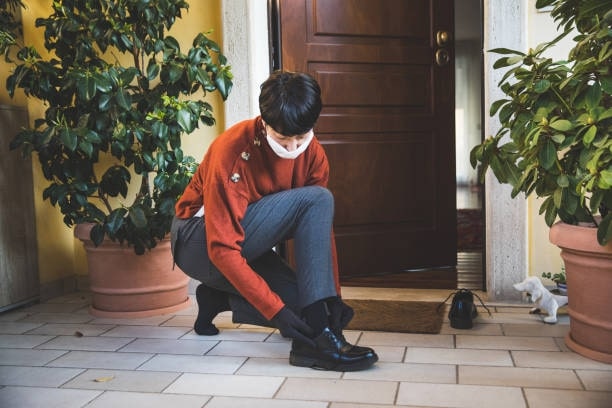
Thailand is known for being a very polite country, and the first thing that many people notice when they visit is how polite everyone is.
It’s also known for having very strict rules when it comes to religious sites and royal palaces, so it’s important to know what those are before you head out on your vacation.
In Thailand, it is customary to take off your shoes before entering a person’s home, a temple, and occasionally a store. It’s as a result of your shoes stepping on the soiled ground outside.
To keep the inside of the house tidy, it is advisable to leave them at the door.
4.DO: Respect the monarchy.

The lese-majeste law of Thailand, which outlaws insulting the monarchy, is one of the harshest in the world.
Since the Thai military overthrew the government in a coup in 2014, it has been progressively enforced, and many people have been punished with lengthy prison terms.
The UN has often urged Thailand to reform the law because critics claim that the military-backed government uses it to stifle free speech.
The measure, according to the government, is required to safeguard Thailand’s monarchy, which is highly regarded.
Section 112 of the Thai Criminal Code defines Lèse-majesté as a violation in Thailand. It is forbidden to criticise, poke fun at, or threaten the Thai king or queen (king, queen, heir-apparent, heir-presumptive, or regent).
Thai law states that anybody who “defames, insults, or threatens the king, the queen, the heir-apparent, or the regent” will be sentenced to a prison term of three to 15 years.
Although the punishment was strengthened in 1976, this law has seldom altered since the country’s first criminal code was established in 1908.
All of Thailand’s most recent constitutions contain a provision that codifies the rule: “The King shall be enthroned in a position of adored reverence and shall not be infringed. No one shall expose the King to any form of allegation or action.”
5. DO: Respect the monks.

If you’re on a tour, you’ll come across monks who are fervent believers who deserve respect.
Crossing paths with one entails a unique set of rules:
- Bow when you meet one,
- Avoid asking them any highly intimate questions,
- Use caution as you get to know them (they can be wary of tourists),
- and never pass anything to them directly; put it down in front of them instead.
Being physically intimate with a monk is completely prohibited, so if you’re a woman, you need to take extra precautions.
Women should avoid touching monks (or their robes), and neither men nor women should ever touch anyone on the head because the head is the part of the body that is most closely related to heaven and could thus be offensive.
6. DON’T: Touch anyone’s head.

Don’t touch anyone’s head in Thailand, not even kids. It is the body’s most crucial component. This includes refraining from touching someone’s head or ruffling a child’s hair.
Touching someone’s head or hair is considered offensive in Thailand because people believe that the head is sacred and the cleanest portion of the body.
If you accidentally do this, apologise right away, and most Thai people will quickly accept your mistake.
7. DON’T: Put your feet up.

As previously indicated, Thailand views feet as being low and filthy. In light of this, it is unacceptably rude to sit with your feet up or cross your legs such that the soles of your feet are visible to other people.
Never put your feet above the head of anyone, especially an elderly person.
Thai etiquette prohibits placing one’s feet on objects that are not intended for them (like a coffee table or a chair) especially in . unclean feet. Maintain yours on the ground.
Tuck them beneath you or alongside you, away from people around, if you’re sitting on the floor.
8. DO: Use your right hand.
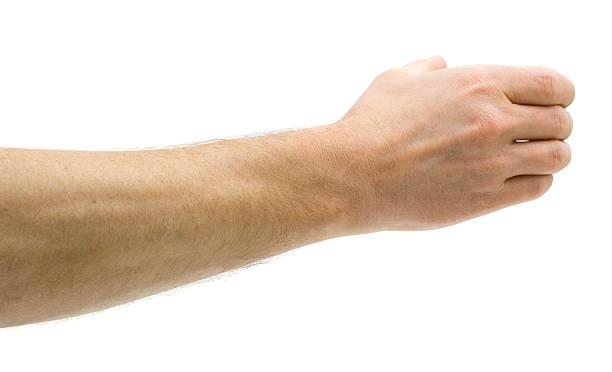
Thais are very polite people, and they have many rules about how to behave in public. In Thailand, when you’re eating food or drinking beverages with someone, you should always use your right hand.
It’s considered rude to use your left hand when handing something to someone, like money or an object. The same goes for eating or drinking.
Always use your right hand to transfer objects to someone and while paying; the left hand is regarded as filthy because it is occasionally used for “toilet functions”.
To avoid offending anyone, remember this rule: When passing something to someone else (like food), make sure that they receive it with their right hand.
When receiving an object from someone else (like money), make sure that they give it to you with their right hand.
If you want to show even more respect, touch your left hand to your right forearm to indicate that it is out of harm’s way.
9. DO: Use cutleries when eating when possible.
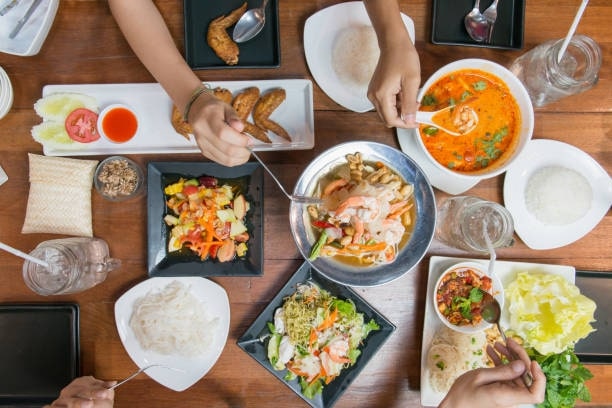
Thai people historically only ate with their hands, but things have changed drastically. Thai people now typically use cutlery when they eat, however there are still some meals they will eat with their hands.
Thus, it may be said that Thai people typically eat with their hands.
Thais typically eat the following meals with their hands:
1. Plain Sticky Rice
This solely refers to the rice that is frequently accompanied by other Thai foods like grilled chicken or other meat dishes. Notably, dishes with chilli-based sauces that are laden with fresh veggies can also be served with simple sticky rice.
Thai people will mix the rice and the food they are eating with their hands while they consume it.
2. Sweet Sticky Rice
Due to the fact that sweet sticky rice is typically prepared with coconut milk, sugar, and oil, it differs slightly from plain sticky rice.
Many individuals prefer to eat sweet sticky rice with their hands, however some people prefer to use cutlery.
3. Seafood
Thailand has a fair amount of seafood. Many Thai people prefer to eat their seafood with their hands, including crab, shrimp, and other types of fish.
To extract the tastiest meat from the seafood, they will use their hands to peel it.
10. DO: Return the ‘wai’ greeting.
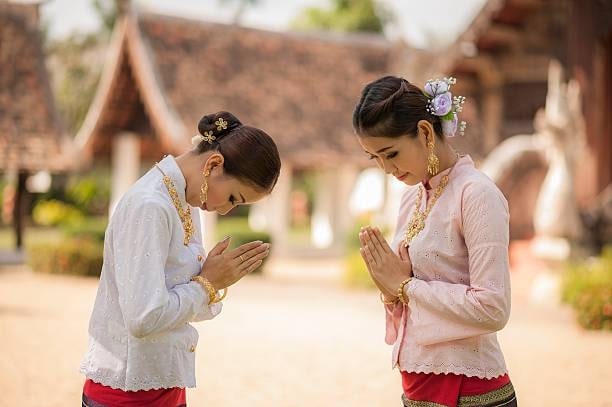
It’s customary to lower your head and clasp your hands in prayer while meeting someone in Thailand, which is known as the wai greeting.
When this gesture is made at you, return it with a smile to blend in with the culture.
Thai people are friendly and inviting individuals who will appreciate having the same attitude returned to them in this straightforward manner.
The wai is a gesture used in Thailand that resembles a prayer, with the hands joined in front and the head slightly lowered.
Only the king and monks are exempt from the requirement to return wais, and doing so is regarded as rude.
If you have something in your hands, try to avoid doing the wai – a small bow will do.
11. DON’T: Lose your temper in public.

In Thailand, it’s often considered inappropriate to yell, lose your cool, or act out strongly.
This is because the Thai people believe that anger is an emotion that should not be shown in public.
If you feel like you are going to lose your temper, you should walk away from the situation and take a deep breath before returning. Always bear in mind the principles of face preservation.
Even when things go wrong, maintain your composure; others will admire you for it.
12. DON’T: Throw things.
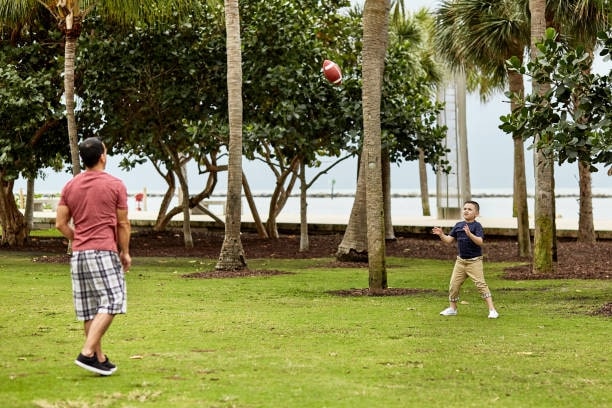
It’s impolite to toss something or money at someone. Give someone your attention when you hand them something, especially with your right hand and face up.
When paying someone, unfold your money.
13. DON’T: Publicly show too much affection.
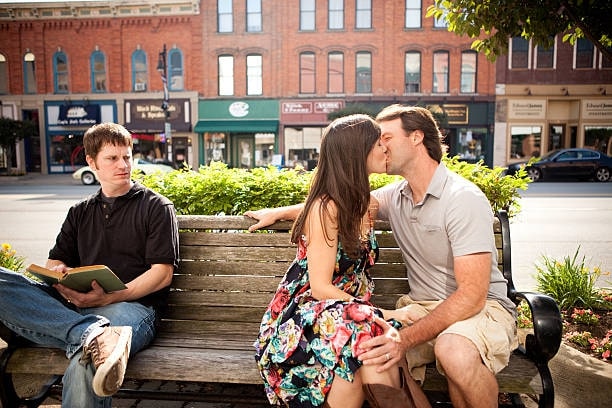
Public making out is frowned upon and can leave bystanders feeling quite awkward.
Kissing in public is strictly forbidden in Thailand, unless you’re in the privacy of your resort or hotel room. On the other hand, holding hands is acceptable in more cosmopolitan locations like Bangkok.
Nevertheless, a short kiss on the cheek or even a kiss on the lips is allowed in major cities like Bangkok because Thais are accustomed to seeing Westerners at this point.
While it is acceptable to kiss a little in public, try to keep it to a minimum because excessive kissing will draw attention and lead to an awkward scenario.
Keep it cool and confess your love later, privately.
14. DO: Smile.
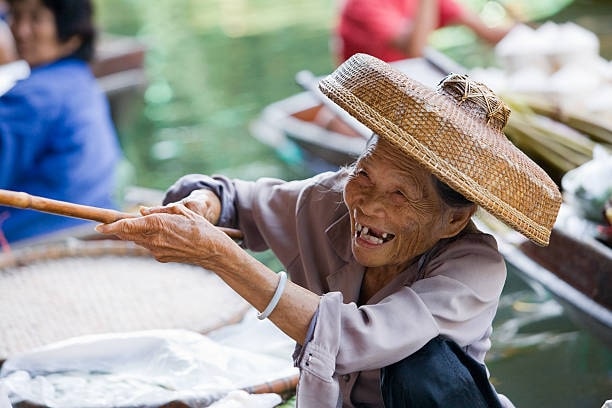
Visitors are frequently taken aback by Thai people’s capacity to smile in almost any circumstance, even when it seems out of character.
Thais always display the well-known “Thai smile,” which is crucial to Thai manners.
Always smile back at them when negotiating, apologising, or when something doesn’t go as planned, smiles are utilised.
15. DO: Lower your head when walking between two people.

The majority of Thai people will squat slightly when passing in front of two persons who are conversing.
To recognize the interruption is to show respect and be polite. The same rules apply if you pass someone while obstructing their view for even a brief moment.


